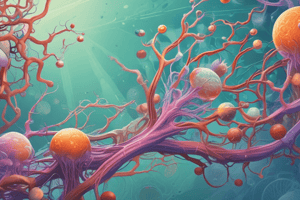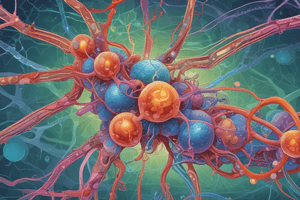Podcast
Questions and Answers
What is the main focus of cell biology?
What is the main focus of cell biology?
- The study of the structure, function, and behavior of cells (correct)
- The study of the human body
- The study of cell communication
- The study of genetics and heredity
Why do cells divide?
Why do cells divide?
- To move in response to signals
- To grow and replace damaged parts (correct)
- To communicate with other cells
- To repair and maintain their structure
How do cells communicate with each other?
How do cells communicate with each other?
- Via chemical signals such as hormones and neurotransmitters (correct)
- By moving in response to signals
- Through cell division
- By repairing and replacing damaged parts
What is the main focus of cell biology?
What is the main focus of cell biology?
Which organelle is responsible for producing the main energy source for cells?
Which organelle is responsible for producing the main energy source for cells?
What is the function of ribosomes in a cell?
What is the function of ribosomes in a cell?
Which subdiscipline of biology focuses on the structure, function, and behavior of cells?
Which subdiscipline of biology focuses on the structure, function, and behavior of cells?
Flashcards are hidden until you start studying
Study Notes
Introduction
Bio, or biology, is the branch of natural sciences that studies life and living organisms. It encompasses various subdisciplines, including cell biology, genetics, molecular biology, physiology, ecology, and more. Cell biology, a central subfield of biology, focuses on the structure, function, and behavior of cells. This article provides an overview of bio and its subtopics, with a particular emphasis on cell biology.
Cell Biology
Cell biology is a subdiscipline of biology that focuses on the study of cells, the basic units of life. It investigates the structure, function, and behavior of cells, as well as the processes that occur within them. Key aspects of cell biology include:
Cell Structure
Cells have a variety of structures that play essential roles in their function, including:
- Membranes: The cell membrane is a lipid bilayer that surrounds the cell and controls the movement of substances in and out of the cell.
- Nucleus: The nucleus is the control center of the cell, containing the cell's genetic material or DNA.
- Mitochondria: These organelles produce ATP (adenosine triphosphate), the main energy source for cells.
- Ribosomes: These organelles synthesize proteins using genetic information from DNA.
Cell Function
Cells perform various functions to maintain life, such as:
- Growth: Cells grow by dividing, allowing new cells to be formed.
- Maintenance: Cells repair and replace damaged parts to maintain their structure and function.
- Movement: Cells can move in response to signals, allowing them to respond to their environment.
Cell Behavior
Cells exhibit several behaviors, including:
- Cell division: Cells divide to grow and replace damaged parts.
- Cell death: Cells can die due to various reasons, such as old age or disease.
- Cell-cell communication: Cells communicate with each other through chemical signals, known as hormones and neurotransmitters.
Conclusion
Bio is a broad field that encompasses various subdisciplines, with cell biology being a central subfield that focuses on the structure, function, and behavior of cells. By studying cell biology, we gain a deeper understanding of the fundamental units of life and their processes, providing insights into various biological phenomena and potential applications in medicine and other fields.
Studying That Suits You
Use AI to generate personalized quizzes and flashcards to suit your learning preferences.




